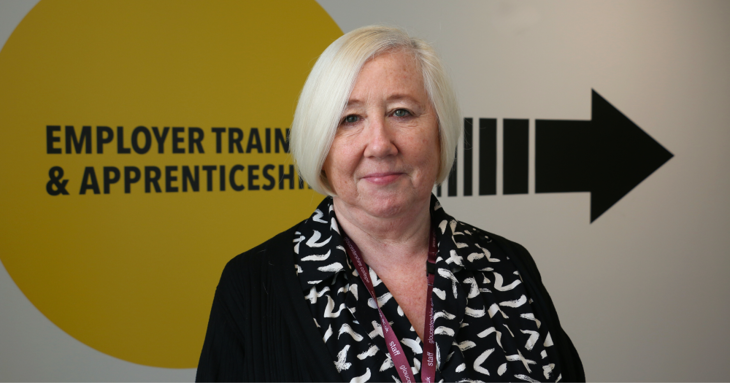As an apprentice engineer, Mikela Lowthian was once one of just a few women in her chosen field. Now a vastly experienced trainer, she is the apprenticeship manager for IT and cyber at Gloucestershire College — at the heart of one of the most exciting sectors in the UK.
SoGlos chatted with Mikela to find out how the industry has evolved over the years and what apprentices are learning today — from AI and programming tools to state-of-the-art robotics.
Could you tell me a little bit your background?
At the start of my career, I completed a four-year indentured electrical/electronic apprenticeship with Xerox. That hands-on experience gave me a strong technical foundation and sparked a long-term passion for engineering and apprenticeships. Over the years, I’ve carried that passion with me, working with engineering apprentices in both industrial settings and educational institutions.
My career has evolved into supporting the next generation of engineers — ensuring they have access to relevant training, mentoring and opportunities that prepare them for the demands of a rapidly changing industry.
What was your experience as a woman starting out? Did you face any biases?
Yes, there were definitely biases — both overt and subtle. On one hand, I was sometimes told outright that I shouldn’t be doing this kind of work because I was a woman or that if I couldn’t physically lift something myself, I didn’t belong in engineering.
On the other hand, there were moments when being a woman seemed to present unexpected advantages — like being encouraged to apply for roles simply to meet diversity quotas. It was a mixed experience but one that shaped my resilience and determination.
Do you think that has changed today?
I’d like to think things have improved significantly. Workplaces have become much more inclusive and attitudes have shifted. It’s no longer acceptable to display things like the old 'cheeky' calendars — which, thankfully, are now relics of the past.
Engineering itself has diversified, not just in terms of people but in the range of specialisms it covers, making it more appealing and accessible to a broader demographic.
What trends are influencing your apprenticeship programmes the most?
One major trend is the overlap between engineering and digital technology.
Apprentices now need to be just as comfortable working with state-of-the-art robotics and programming tools as they are with traditional mechanical systems. Technology is evolving so quickly that our programmes are constantly being updated to reflect what’s current in industry. Employers want apprentices who are adaptable and digitally literate.
If AI is one of these trends, what impact is it having on the industry?
AI is having a significant impact, not just in how we work but also in how we train. It’s enabling predictive maintenance, enhancing automation and transforming data analysis in engineering environments.
In training, AI tools are starting to help personalise learning and identify skills gaps more effectively. It’s also a key area where we need to build understanding early, so apprentices can work with these technologies rather than be replaced by them.
With Gloucestershire penned as the UK's cyber capital – and with cybersecurity evolving so fast – how do you keep apprentice training current?
We work closely with employers and industry bodies to ensure our curriculum is aligned with real-world needs. Regular industry input helps us stay ahead of emerging threats and new technologies. We also invest in staff training and partner with leading tech providers so that apprentices learn with the most up-to-date tools and frameworks.
Flexibility is key, we regularly revise content to reflect the fast-moving nature of cybersecurity.
The Golden Valley Development has moved into its next stage of delivery, what opportunities will this create for apprentices/students?
The Golden Valley Development represents a huge opportunity for the region, bringing in new businesses, innovation hubs and advanced digital infrastructure.
For apprentices and students, this means access to cutting-edge employers, real-world projects and the chance to be part of a pioneering tech and cyber community right here in Gloucestershire. It’s a game-changer for the local skills economy.
Are there any plans to launch any new apprenticeships to support the growing skills demand in the sector?
Yes, we’re actively working on developing new programmes in digital, cyber and AI-related areas to support the growth in demand.
We’re in consultation with employers and government bodies to ensure these apprenticeships are future-proofed and meet real industry needs. We want to ensure learners are not only employable but ahead of the curve in their chosen field.
Is there any additional news/investments you would like to share?
There are several exciting developments, including increased investment in digital labs, simulation suites and collaborative spaces that mirror modern workplace environments.
We’re also seeing increased employer engagement and support for flexible apprenticeships and modular training, especially to help upskill existing staff. The future is bright for both learners and the wider tech and engineering community in our region.
To find out more about how Gloucestershire College can support your business talent development strategy, contact employer.training@gloscol.ac.uk or visit gloscol.ac.uk/employers.











.jpg?width=690&height=361&rmode=pad&bgcolor=ffffff&quality=85)



.jpg?width=432&height=227&rmode=pad&bgcolor=ffffff&quality=85)






